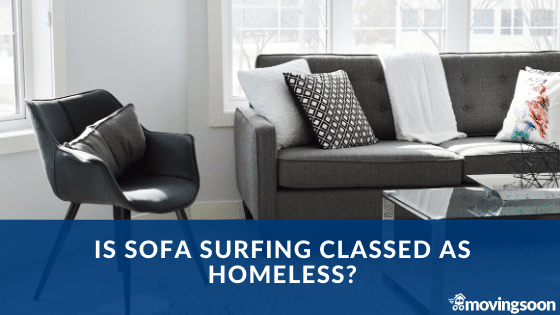Sofa surfing. Is it classed as homeless? That is a good question and one that can cause some confusion as well as problems for the ‘sofa surfer’ in question. But before we go down the path of the implications of sofa surfing and what you can do to help your situation, let’s clear up a few points by explaining what it means.
By the end of this article, you should understand the sofa surfing definition (also known as couch surfing), the problems that can arise and what can be done to end the cycle.
Search affordable housing to rent >
What is sofa surfing?
“noun informal
(of a homeless person) the practice of staying temporarily with various friends and relatives while attempting to find permanent accommodation”
According to the Collins Dictionary definition, a sofa surfer is indeed classed as homeless. They are an individual, or family who have no fixed address of their own. They do not rent or own a property. However they are not sleeping on the streets. Instead, they are staying with friends and/or family and even sometimes, acquaintances who have offered their good will. This quite simply, is how couch surfing works.
If you are sofa surfing and are worried you may be asked to leave within 56 days, the council should help you as you are ‘threatened with homelessness’ .
Sofa Surfing and Council Tax
“I am sofa surfing, do I need to pay Council Tax?”. This is a common concern, however one that thankfully, is easy to answer. Council Tax must be paid by a homeowner or tenant renting a property. Because a sofa surfer is only staying on a temporary basis, they would not be liable to pay. However, it is worth reminding the friend or family member who is accommodating you, that if they are claiming single person’s discount on their council tax, they may need to let the authorities know that they have someone staying with them.
Sofa Surfing and Benefits
Even if you have no fixed address, you could still be entitled to claim some benefits. You can use the address of your temporary accommodation for your benefit entitlement. You should visit your nearest JobCentre to discuss what you are entitled to and to let them know where you are staying.
There is even a scheme for those who need to claim benefits but don’t have a bank account. This is known as Payment Exception Service and full details can be found at GOV.UK
Why are there so many people sofa surfing?
There are many contributing factors as to why so many people find themselves sofa surfing. The main reason is simply that, they can not afford to rent/buy anywhere or there is no where suitable available.
In a piece created by crisis, they explore the reasons why people end up sofa surfing. 54%/61 of those in the study the y conducted stated that issues related to housing affordability were a factor in starting to sofa surf. The other main reasons was the welfare reform with over a third 38%/26 citing the gap between Local Housing Allowance rates and Housing Benefits and rents led them to sofa surf.
There is more emphasis than ever in the need of creating more affordable homes.
How to stop sofa surfing and find a home of my own
It can be incredibly difficult when you are effectively homeless and unclear how to end the cycle of sofa surfing. It is the council’s duty to help you to find a home and there is some helpful advice on the Shelter website.
You may be able to apply for an affordable property to rent from a housing association too. Most housing associations do not request a deposit and accept applicants who are on benefits. However, as you do need to keep up your monthly rent payments, it is worth getting your income and any benefits in order first.
We have created a piece on how you can save for a deposit. Hopefully this will give you some tips so you can save for either your rental payments each month or getting a deposit together.
If you are ready to search for affordable rental property, using a specialist site like MovingSoon will help you locate something suitable. Start your rental property search today. Don’t forget you can also sign up to receive property alerts.
Once you have found a place to live use our moving house checklist which lists the things you need to do when moving house.


